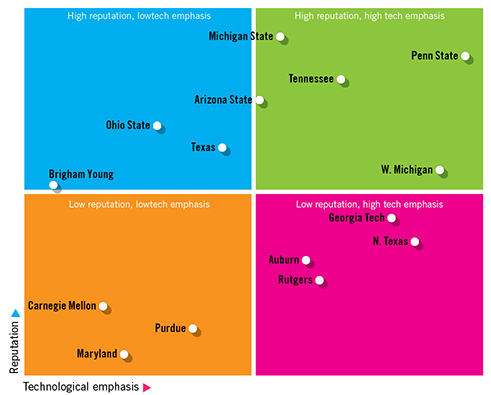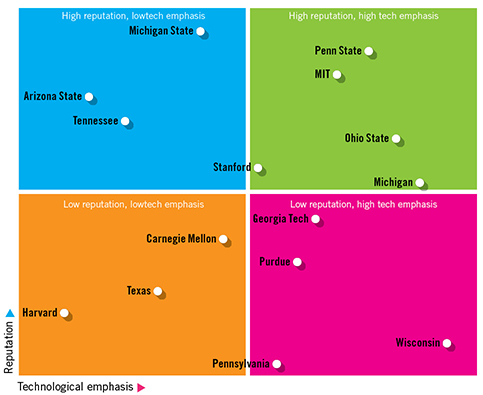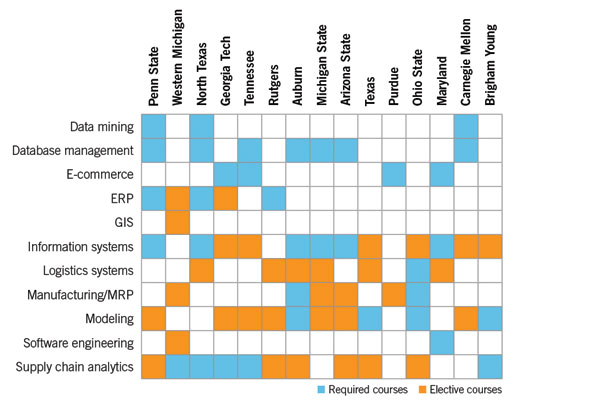The Top Universities for Supply Chain Technology Education

Worried about the talent gap? You can’t go wrong staffing your supply chain team with recent graduates from these highly ranked university programs.
Supply chain management (SCM) is a relatively new field of academic study. Only in the past few decades have universities begun to offer SCM majors and concentrations, merging aspects of business, information technology, and logistics into one pedagogical framework.
Top Universities: 5 Key Findings
Information technology (IT) plays a critical role in the complex web of supply chains that define the global economy. As a result, it has never been more important for new professionals in the supply chain field to have experience with the digital tools that are essentially the backbone of major supply chain operations.
To give prospective students—and their employers—greater insight into the curriculums of some top SCM programs in the United States, Software Advice, a Gartner information technology research and advisory company, analyzed the strength, depth, and variety of software- and IT-related courses in those programs.
To determine which universities to examine, Software Advice aggregated the most recent rankings for SCM programs from a variety of sources. It then determined the top programs in the nation based on their presence and placement in those rankings, providing a total of 15 undergraduate programs and 15 graduate programs in its aggregate “reputation ranking.” From there, the company examined the SCM curriculums and course syllabi for all the universities in its reputation ranking. It primarily measured how many software- and technology-centric courses are required as part of the curriculum, and how many are offered as elective courses.
Software Advice then rated these courses based on the amount of hands-on instruction students receive, and the depth of the material presented on a scale of one to three. It also awarded points to universities that offer certain courses as part of their SCM curricula. After factoring in all these variables, Software Advice scored universities on a scale of zero to 36, and used these scores to create the list of top technology-focused universities (see the list on page ).
To gain more insight into the survey and what its findings mean to both logistics job seekers and hirers, Inbound Logistics spoke to Forrest Burnson, market research associate for Software Advice:
IL: How did you determine what schools to look at? And what methodology did you use to rank them?
BURNSON: We compiled our sample by aggregating the top supply chain management programs from several other rankings, including Gartner’s and U.S. News and World Report. We then ranked the schools based on factors such as the number of required software and technology-centric courses they offer in their programs, what percent of the entire curriculum those required courses constitute, and what electives are available. We rated each course on a simple scale based on the depth of its material, and the amount of hands-on instruction students receive.
IL: Why is information technology critical for new supply chain management professionals?
BURNSON: Supply chain professionals are vital assets to whatever company employs them. They not only make large enterprises work, but also make them more competitive. They’re confronted by an insane volume of business data every day, and they need to be able to make sense of it in order for that enterprise to execute on its vision. You can’t make sense of that data if you don’t know how to use the right tools to process it. So, it’s essential for new supply chain professionals to have a firm grasp of information technology when they enter the field. It’s only going to become more important.
IL: Why is there more emphasis on ERP in undergraduate courses compared to graduate courses?
BURNSON: Good question; I’m not entirely sure. But, if I had to guess, it might not get as much emphasis at the graduate level because there is an assumption that graduate students have some working background in supply chain management and logistics, so they might already have been exposed to ERP in a business environment. The graduate programs we looked at tended to be more rigid and structured, as they are generally two-year programs so they have a lot of ground to cover in a shorter period of time.
IL: What helped Penn State (undergraduate) and University of Wisconsin (graduate) rise to the top of the list?
BURNSON: Both programs offer a wide variety of software- and technology-centric courses in their SCM programs. Penn State’s program is particularly special due to its ‘cross-pollination’ with the information systems management department—it’s an interesting hybrid program in many respects. Similarly, Wisconsin clinched the top spot because of the strength of its elective offerings; graduate students there have a lot of choices. Wisconsin is also one of the few graduate programs to require a full ERP course.
IL: Why do some top SCM schools fall lower on your list?
BURNSON: The schools that didn’t perform as well tended to offer fewer software- and technology-centric courses, and those they did offer tended to be more lecture-based. To be clear, this isn’t to say they’re not good programs—we’re just looking at one measure and evaluating the universities based on that alone. All the universities we examined have well-regarded supply chain programs or a reputation for producing high-quality supply chain professionals.
IL: We’ve seen a lot of crossover between traditional business management (MBAs for example) and engineering programs and supply chain/logistics. Has a similar convergence happened between computer science programs, information systems, programming and supply chain?
BURNSON: Yes, a few programs in our ranking do just that. Penn State and Western Michigan University are probably the best examples of SCM programs that intersect with functions such as information systems and software engineering. I think we will see more of that convergence in the future. SCM, after all, is a relatively new field of academic study; it’s constantly evolving. So many universities will begin looking more closely at what Penn State, Western Michigan University, Wisconsin, and other schools are doing and will adapt their curricula accordingly.
Read the full study at:www.softwareadvice.com/scm/industryview/top-universities-report-2015
Undergraduate: Reputation vs. Technological Emphasis
To better understand how the reputations of undergraduate programs compare with their technological emphasis, Software Advice compiled both rankings into this quadrant graph. The upper right quadrant represents the leaders in SCM technology education. Penn State ranks at the top, primarily due to the strength of its elective offerings, which provide hands-on, in-depth coverage of SCM technology and include courses from both the SCM and Management of Information Systems departments. These course offerings are bundled together in the university’s supply chain and information systems major, which significantly emphasizes the role of IT in supply chain management. In addition to standard, software-heavy SCM course fare, such as demand planning, and fulfillment and supply chain analytics, Penn State offers a host of courses in the MIS department.
Graduate: Reputation vs. Technological Emphasis
The University of Wisconsin is hot. On top of offering SCM students a number of electives in information systems, logistics systems, and analytics, Wisconsin also requires students to take an ERP course. Software Advice admits that the graduate programs in its sample are more difficult to compare than the undergraduate programs. While certain universities offer some sort of master’s degree in SCM, others offer MBA degrees with a designated SCM concentration or a high number of SCM-related course offerings. Still other MBA programs don’t offer either of these, but simply have a reputation for producing high-quality professionals.
As such, while Harvard is one of the world’s most prestigious universities, its reputation ranking is low because of its slim offerings and lack of a concentration or track in SCM as part of its MBA program.
SCM Technology Courses
ERP emphasis is more prevalent at the undergraduate than graduate level. Four undergraduate programs on the list offer a class devoted to learning an ERP platform, compared to just one graduate program.
One caveat is that many universities have partnerships with ERP vendors, such as SAP and Oracle, and offer certificate programs for those platforms. They might also offer courses outside of the business school or SCM program, which may or may not be available to SCM students.
Although many graduate and undergraduate SCM programs don’t offer courses devoted strictly to ERP, they still offer a variety of software- and technology-centric courses. Modeling, analytics, information systems and logistics systems are prevalent, and all are essential for SCM processes.
Top 15 Universities for Supply Chain Technology Education
| Rank | Undergraduate | Graduate |
| 1 | Pennsylvania State University | University of Wisconsin |
| 2 | Western Michigan University | University of Michigan—Ann Arbor |
| 3 | University of North Texas | Ohio State University |
| 4 | Georgia Institute of Technology | Pennsylvania State University |
| 5 | University of Tennessee | Massachusetts Institute of Technology |
| 6 | Rutgers University | Georgia Institute of Technology |
| 7 | Auburn University | Purdue University |
| 8 | Michigan State University | University of Pennsylvania |
| 9 | Arizona State University | Stanford University |
| 10 | University of Texas at Austin | Carnegie Mellon University |
| 11 | Purdue University | Michigan State University |
| 12 | Ohio State University | University of Texas at Austin |
| 13 | University of Maryland—College Park | University of Tennessee |
| 14 | Carnegie Mellon University | Arizona State University |
| 15 | Brigham Young University | Harvard University |
Note: A university’s position on Software Advice’s reputation ranking did not determine its position in the final list; this ranking was used merely as the basis for deciding which universities to include in the sample. The final list is based solely on the aspect of software and technology education, and is not indicative of the overall quality of these programs.
Top Universities: 5 Key Findings
To learn more about what supply chain management courses teach students, and how they compare to one another, Software Advice ranked the top 15 universities at the undergraduate and graduate level, based on the extent to which they emphasize the teaching of SCM technology, software, and quantitative tools used by supply chain professionals, as well as the variety and depth of this coursework. Among the findings:
- Pennsylvania State University ranks first for supply chain technology education at the undergraduate level, followed by Western Michigan University.
- University of Wisconsin ranks first for supply chain technology education at the graduate level, followed by the University of Michigan.
- Michigan State, described as the top school for SCM on other lists, ranks eighth and 11th on the list for undergraduate and graduate technology education, respectively.
- Four of the 15 undergraduate SCM programs analyzed offer a class devoted to learning an enterprise resource planning (ERP) software platform.
- Just one of the 15 graduate SCM programs analyzed offers a class devoted to learning a commercial ERP platform.



